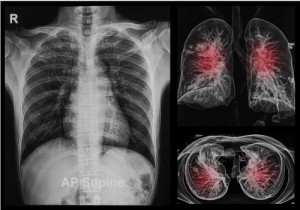NIH Awards 5-Year, $15.6 Million Grant For IPF, COPD & CF Novel Agents Trial
Written by |

 The National Institutes of Health (NIH) recently granted a $15.6 million award to The University of North Carolina, Chapel Hill (UNC-CH) and The University of Colorado, Denver (UCD), to support five years of research on mucolytic agents. The agents were discovered by the developmental stage biopharmaceutical company Parion Sciences, which has been dedicated to creating a novel therapy for pulmonary ocular diseases, and the NIH expects the investigators to file Investigational New Drug (IND) applications for the project.
The National Institutes of Health (NIH) recently granted a $15.6 million award to The University of North Carolina, Chapel Hill (UNC-CH) and The University of Colorado, Denver (UCD), to support five years of research on mucolytic agents. The agents were discovered by the developmental stage biopharmaceutical company Parion Sciences, which has been dedicated to creating a novel therapy for pulmonary ocular diseases, and the NIH expects the investigators to file Investigational New Drug (IND) applications for the project.
During the first year of the project, researchers from the UNC-CH will use $1.46 million from the Centers for Advanced Diagnostics and Experimental Therapeutics in Lung Disease (CADET) to initiate pre-clinical research, focused on the use of mucolytic agents related to chronic obstructive pulmonary disease (COPD), and cystic fibrosis (CF). The total funding for the research at UNC-CH over the next five years will total $7.7 million.
The second CADET portion of the award, which is comprised of $1.52 million for the first year for a total of $7.9 million was granted to UCD, which will be more focused on studying idiopathic pulmonary fibrosis (IPF), and the influence of Parion’s mucolytic agents on the disease. Both of the grants may be renewed after the five years for two additional years under annual review.
[adrotate group=”3″]
“As a science driven company, it is gratifying to partner with such premier academic institutions like UNC and UCD to successfully secure the competitive NIH Awards,” said the president of Parion Sciences, Paul Boucher. “The NIH support and the combined expertise of the collaborations boost our innovative mucolytic program as we advance through the pre-clinical stages.”
Even though the implication of the mucolytic agents in treating these diseases is not yet fully understood, Parion believes that the novel agents will be able to target and clear mucus from the lungs. Since there are several diseases, including severe and chronic pulmonary conditions, that cause mucus in which patients need adherent secretions clearance from the lungs, it may revolutionize pulmonary treatment. If approved by the U.S. Food and Drug Administration, the treatment aims to change the quality of life of thousands of patients suffering from COPD, CF, and IPF.





